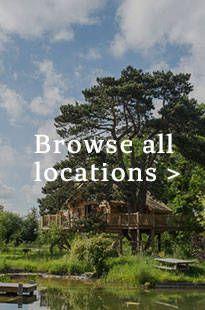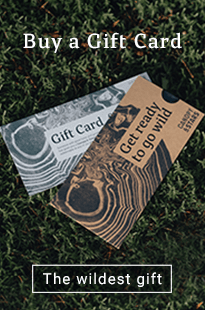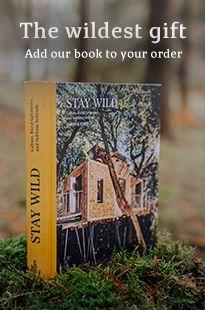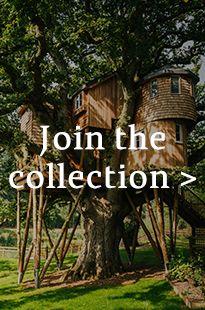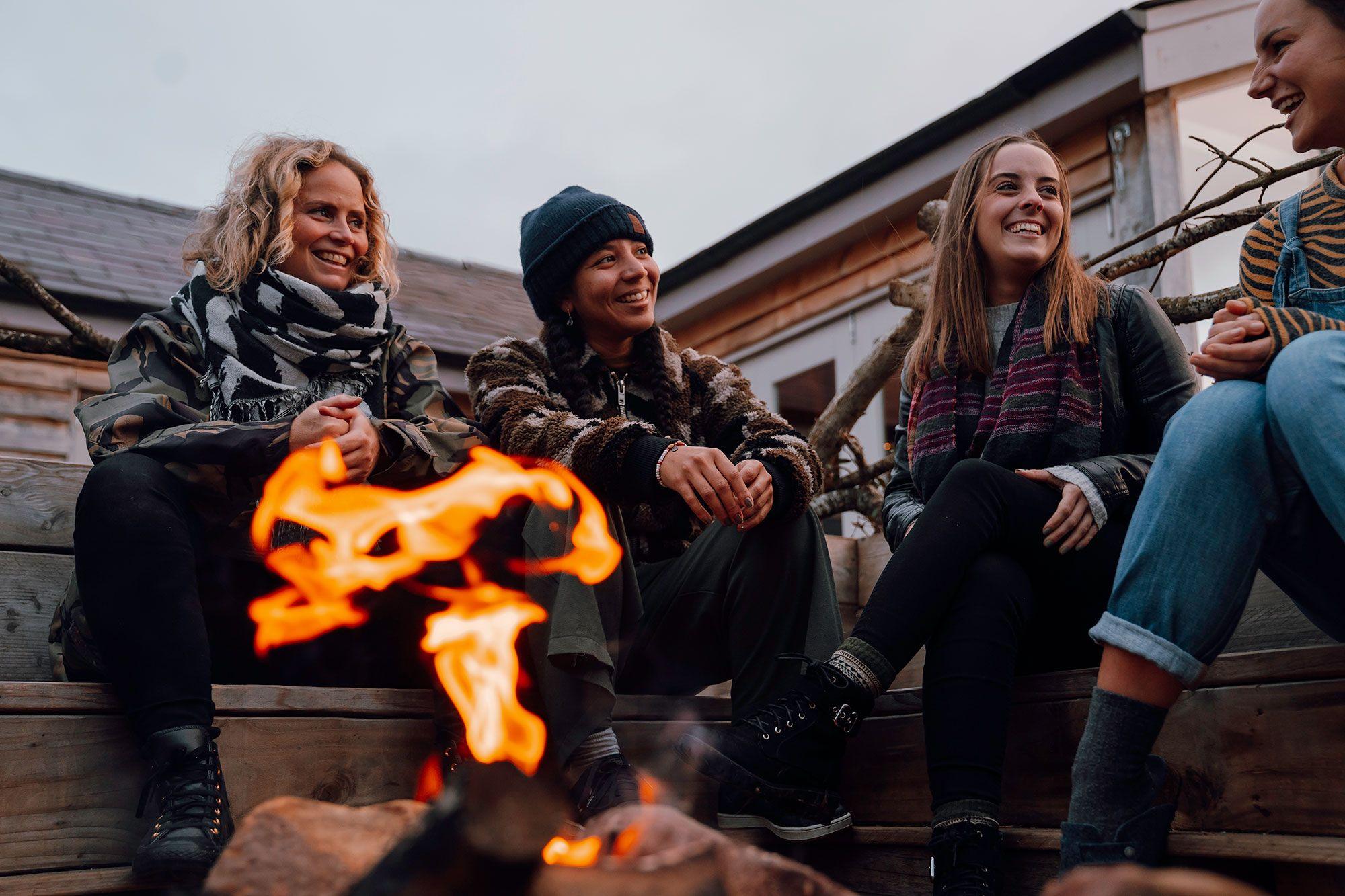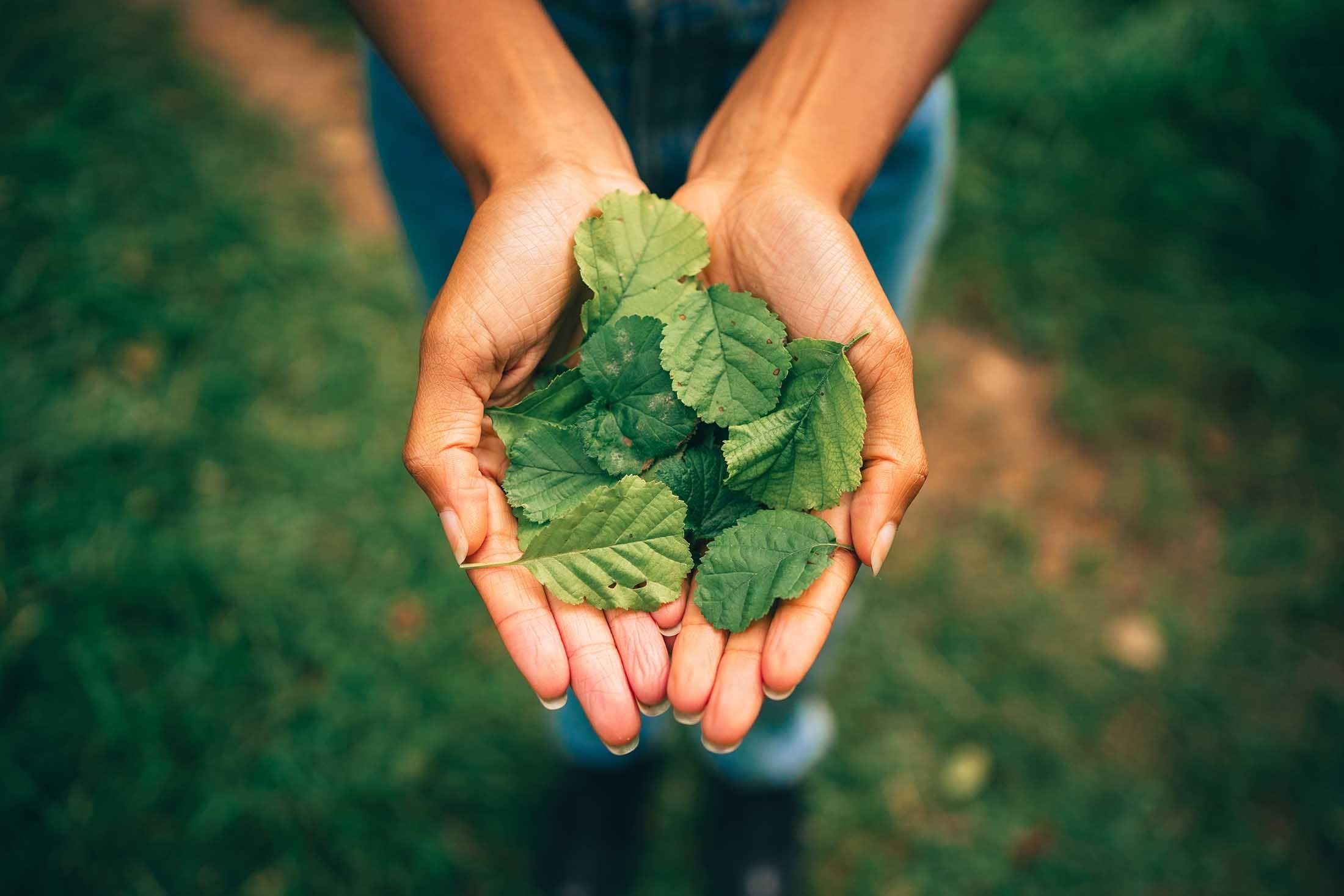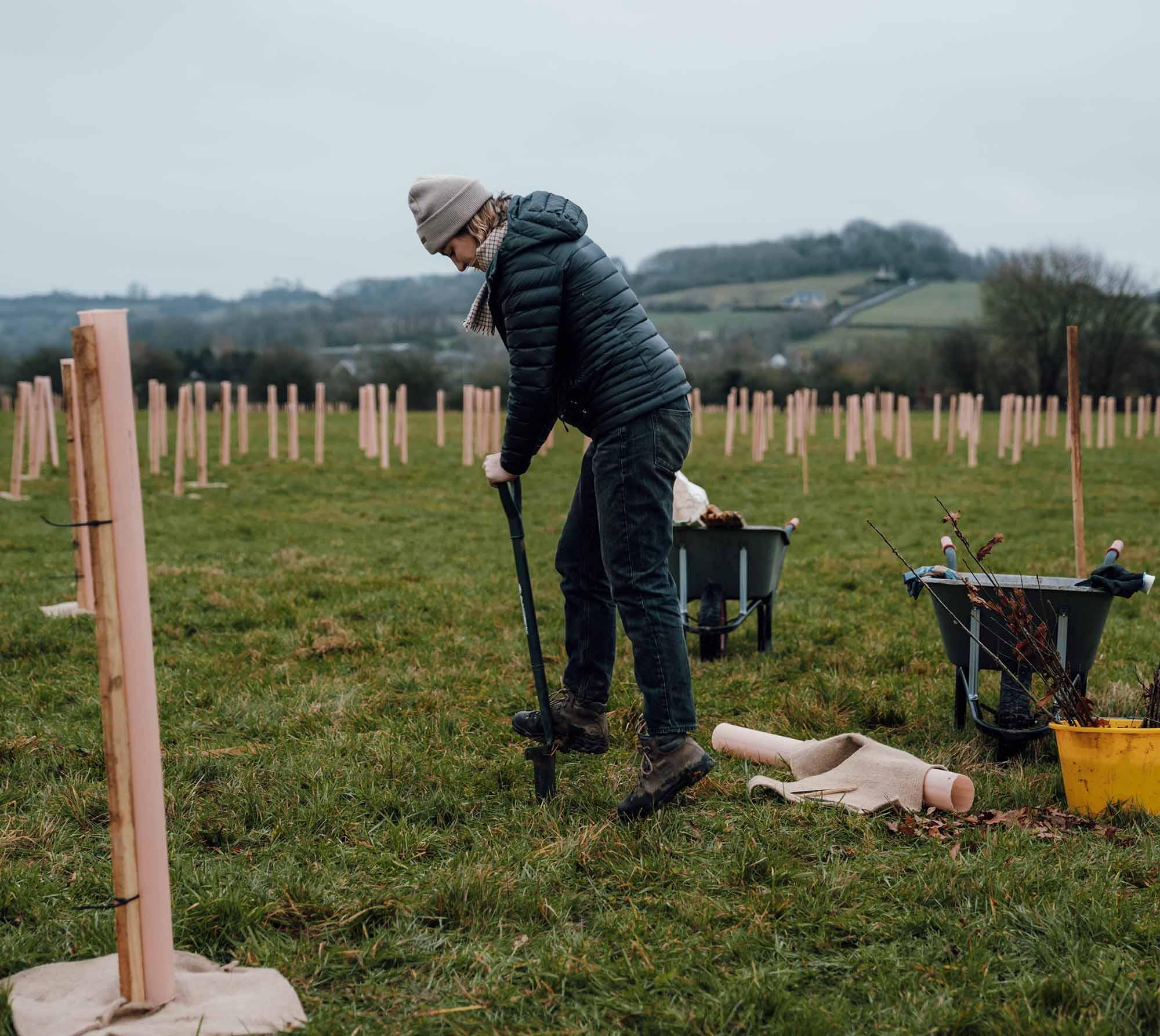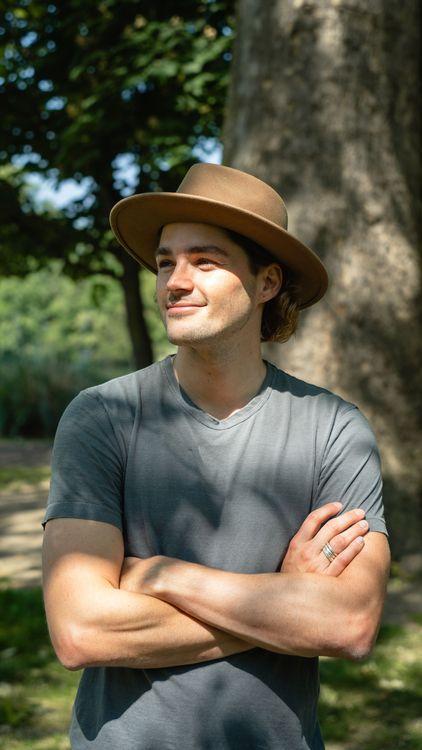
A Life More Wild - Series 3 Episode 6
Jack Harries
Jack Harries on meeting Obama, seeing glaciers melt and his second favourite place in Hackney
On a trip to Greenland, Jack Harries saw a huge chunk of ice break off a glacier and crash into the sea. Already a keen filmmaker with an interest in travel, he knew then what he wanted to dedicate his whole life to - telling the stories of climate change. Years later, he has been all over the world, finding the people most affected by the climate crisis and giving them a voice, in his documentary series, A Seat at the Table.
I wanted to talk about a message that was important and climate and the environment really came to the forefront of my mind. That was kick-started on a trip to Greenland in 2015 with the WWF, where we went and saw the Jakobsvahn glacier, one of the fastest retreating glaciers in Greenland. It was the first time I really understood climate change, saw it firsthand. I heard it. I felt it.
Today is a sunny Friday in Hackney. We're right in the centre of Hackney, stood outside Mare St Market, which is one of my favourite places. It's a cafe, restaurant, bar, I get my hair cut here, we come here for drinks and meetings, I work just around the corner. So this really is home for me. And we're about to head off to my second favourite place in Hackney, which is Victoria Park, which is a beautiful green space that I walk around very regularly.
All we can do is our own little bit. If you want to reduce emissions, want to reduce the amount of carbon we use, we have to be more local, you know, it's not as simple as just continuing to live the way we live and switching to green energy. We need to actually change the way that we live, we need to make it less carbon intensive, less energy intensive, and localism is an amazing answer to that. There's also some beautiful aspects to it. I think a lot of us discovered that in the pandemic, when suddenly we slowed down and we started to look to our immediate surroundings and discover who our neighbours were and how they could help us and how we could help them back. That's been a big journey for me actually, discovering the power of community, the strength and resilience and community.
There's been some very surreal moments in my career over the last few years. Interviewing Sir David Attenborough was definitely one of them. I would say that was the second most nerve wracking day of my life. The first was when I had a chance to interview Barack Obama. It's impossible to say that without sounding like some sort of name-dropping humble brag, but it's Barack Obama! I still haven't gotten over it.
Both of those days was were completely surreal. I decided for some stupid reason just before the interview [with Obama at COP26] that I wanted to name every single one of the characters that was in our documentary, because I felt, you know, this wasn't about me meeting him, it was about bringing these stories that we've captured along the way to COP and to Barack Obama. So, you know, he comes out the building, I walk up to him, I say, Mr. President, which is what you're meant to call him, even though he's no longer actually the president of the United States. Then we start walking and I attempt to name every single one of our characters. And of course, I forget the names, and I completely stumble. But he was so cool. And he was so kind and just, like, helpful that he helped me breeze over it and we just totally picked up the conversation. We sat down on a bench, and then we had the loveliest chat, which went on for 20 or 30 minutes, way longer than the time that was allotted. And I just felt really grateful to him, you know, he could have been much... ruder you know, "I'm busy I need to get on with this" but he was he was really generous with his time and put me totally at ease to in his presence. That was an experience I'll never forget.
So we're at St. Agnes gate, in Victoria Park, which is the gate closest to my house and where I work. It's got a few beautiful lakes. It's got the amazing pavilion cafe and today we're just gonna do a little stroll around the west part of the park. We're gonna go past a community owned vegetable patch, through some woods along the canal. And we're going to finish at the pavilion cafe, one of my favourite spots.
I grew up in West London and my mum was a filmmaker. Originally, she made documentary films. So I grew up in a household where filmmaking and storytelling was a big part of my everyday life. My father is also a television producer. And my grandfather is a writer, so I sort of grew up in a family of storytellers. But my mum was also a very passionate environmental activist. And she used to take my brother and I to protests, like the Heathrow third runway. And I remember her going to lock herself to the Houses of Parliament one day and telling us she may be arrested. And of course, when you're a kid, or like a teenager, you just think this is the lamest thing ever. And you have nothing to do with it. But clearly, some of it rubbed off on me. So when I grew up, I wanted to be a filmmaker. And I started making films when I was 18, and posting them up onto YouTube. And really, it was just a way of keeping myself busy on my year off before university and sharing what I was doing with friends and family, there was no big intention to it. And certainly activism wasn't at the forefront of my mind. But that took me into a whole journey of discovering YouTube and building an audience on there. And somewhere along that way, I started to really feel a responsibility that we had an audience, I wanted to talk about a message that was important.
What I'm currently looking at is a beautiful wild garden can see roses, you can see vegetable boxes, lots of overgrown greenery. And this is a community owned vegetable garden. So members of the community come here and they learn to grow. And they learn about food production. I think this is so rare to have in the middle of a city. And not many people know this is here. It's tucked right away in a secret corner of Victoria Park. But if we walk around a little bit, we might be able to peek more over the windows. Every now and then I'll see volunteers in here. And I just think it's a really cool thing to have in the middle of a park.
When I look back at the last few years, and I think about the different trips I've been on, there are many moments that have impacted the way that I think and changed my perspective. For some reason, the one that really jumps out was a trip I went on to an island called Kiribati in the South Pacific in 2018. Kiribati is one of the lowest-lying island nations in the world. For me, it was the first time that I really understood the concept of climate justice or climate injustice, you know, the idea that those who have done the absolute least to cause this crisis are suffering the most. And that made me really angry and it made me want to take action
I think partly I liked these types of spaces so much because I grew up in West London and there was a nature reserve right where I grew up. It was called The Triangle and it was just this little triangular bit of land by the tube station that someone had just preserved as a nature reserve. And you would go through the gates and it was just like this whole wild world would develop. I remember there were snakes in there, they had a pond with tadpoles and butterflies and grasshoppers and I just have such a childish sense of excitement when I go into those spaces. Bits of Victoria Park remind me of that. It takes me back a little bit.
We're just headed out towards the canal which banks alongside one side of Victoria Park, and the canal is one of my favourite things in Hackney. Personally, I just love water, and you can probably hear in the background, lots of bikes and runners coming past. That's a great place to go and run. It's a long, straight stretch and actually you could run or cycle along this canal all the way from here to West London, which I used to do when I was training for the Hackney half marathon. That's another reason I love Victoria Park - from my house round Victoria Park and back, it's almost exactly a perfect 5k. And this is coming from someone who isn't a runner who was never very good at running. But this year, I signed up for the Hackney half and this became my place to come.
I'm looking at lots of houseboats, canal boats, some of them stacked up kind of two deep, in order to get a good mooring spot. I think if you live on a canal boat, this is a very sought after spot to be, right in the middle of Hackney. And of course, next to the park. And I love walking along here and just looking at the house boats. Because for me like this one right in front of us, right I'm looking at one that has been kind of... don't know how to describe it. Lots of upcycled bits of wood have been used to create this houseboat. It's very, very homemade, but beautiful. It's like a beautiful piece of art to me. I love looking at the way people live and the ingenuity of humans, when they want to find somewhere to live that's a little bit more outside of the norm. There's one in front of me now that is looks like it's an old lifeboat. A bright orange kind of thing that I imagined would be used as a life raft on a much larger ship, but someone has turned it into their house. And why not? You know, I feel like London is so expensive. It's so overpriced. I think it's really cool that people are finding alternative ways to access the city. And living closer to nature. Lots of these houseboats have plants growing off the roof. This one's got beautiful flowers on top, and some of them have solar panels.
In the climate, environment space, there's a lot of storytelling that is quite scary. There's a lot of doom-ism, there's a lot of people, they call it doom scrolling, where you're going through social media, and it can be really terrifying and I think that can often lead to a sense of paralysis. You think, Oh, this is such a big issue and it's so out of my control, what can I do? And in my storytelling, with Earthrise, which is the media company that I run, we really believe in this idea of radical optimism, you know? We need to paint a vision of the future that we want to see. Otherwise, how are we going to be able to get there? So for me, it's about being realistic about the severity of the crisis we're facing, but also embracing the creativity of storytelling, and the power of imagination to paint a different picture.
I mean, here's a really tangible, relevant example. Right now, at the time of recording, New York is shrouded in orange dust clouds, it's all over the news. And this is because of wildfires that are out of control in Canada that are blowing down smoke, and I think lots of people are feeling really anxious about this. It's a rare example of climate change suddenly feeling like it's on the front doorsteps of people living in cities. I've been feeling really anxious about it too. But then just this morning on Twitter, I saw this incredible footage of 200 South African firefighters who have arrived in Canada, to help fight wildfires, and they did this incredible song and dance to sort of, you know, announce their arrival. And that gives me a lot of hope. It reminds you of the solidarity that these situations can lead to, the power of humanity when we come together to try and take action. So we need these little moments of hope to uplift us even in the face of crisis.
So we've been walking down the canal, we're just coming back to the entrance of Victoria Park and there's a really lovely sight. There's a boat here at the lock gates, as I speak, are just opening and you can see it's being manned by volunteers and there's actually a sign that says volunteers on lock duty. That's part of the canal and river trust. And then just across the canal is a woman in an amazing bright pink dress and her two dogs which you can probably hear barking and she's snipping away at her overgrown roses in her garden which goes right down to the edge of the canal. This is a lovely Hackney scene for me, it's a lovely example of community.
Something I've been consciously thinking a lot about is the dichotomy of flying around the world to report on climate change, and I have a real guilt around my own carbon emissions. So something I've been trying to do much more intentionally is not fly. It's why I'm so excited about this series Wild Weekends, I'm doing with Canopy & Stars, because it's given me the opportunity to do just that - hop on a train to get in a nice, electric mini in one case, and go and explore, you know, some of the wilder parts of the UK.
The first one is in Herefordshire, the second one is in Wales and the next two, we're gonna be going down to the south of the UK around Kent. In each one, we go and stay in incredible Canopy & Stars accommodation, and then discover that local area and do amazing activities. So it could be cider tasting, wood carving, canoeing down the river Wye, for example. It's just a lovely time away with a group of friends in nature and it's a reminder that even over the course of a weekend, you can have an incredible adventure, you can get out in nature, you can spend time with friends and go canoeing down a river, you don't have to get on an aeroplane, you don't have to burn immense amounts of carbon. You can still have that feeling of adventure and being somewhere new and having new experiences. So yeah, it's been a really lovely reminder of that..
We've just banked off Regent's canal, back into the park and we're coming to one of the most dramatic parts of the park. So up until now, we've been kind of lined by trees on either side and suddenly, the park opens up in quite a dramatic way. On my left, I'm looking at a beautiful lake and in the middle is quite a dramatic water fountain. Then across the lake, you can see Pavilion Cafe, which is in a beautiful, Victorian style pavilion. It's great for coffee and granola and pastries. And it's a really lovely place to come and have breakfast, which I don't do enough, but every time I do, it just makes me feel really happy and peaceful to come and sit on the little balcony that looks out over the lake. It's a boating lake as well. So you can rent little row boats, and go out on the lake for the day.
I mean, I love being a filmmaker and having a camera partly because, it a passport to go to all these incredible places. You know there are so many moments where I'm holding a camera in my hand and I think I would not be having this experience if I didn't have a camera with me. But at the same time, of course, when you're filming and you're in work mode, there's a slight separation from what you're experiencing and it's so lovely to come to places like this, where you're not holding a camera and you're just experiencing it for yourself. I'm sure many people can relate to that feeling as well. I go to grab my phone, to put it on social media and then I'm like, "no Jack, you don't have to share everything. You can just enjoy this you know for yourself." So that is something I'm always trying to remind myself of.
If you haven't watched A Seat at the Table, check it out to see some powerful testimony from the people most affected by the climate crisis. Remember, if you haven't already, to give us a follow on your podcast app, tell a friend about the podcast, and check out @canopyandstars on Instagram to see footage and photos from our days out recording.

